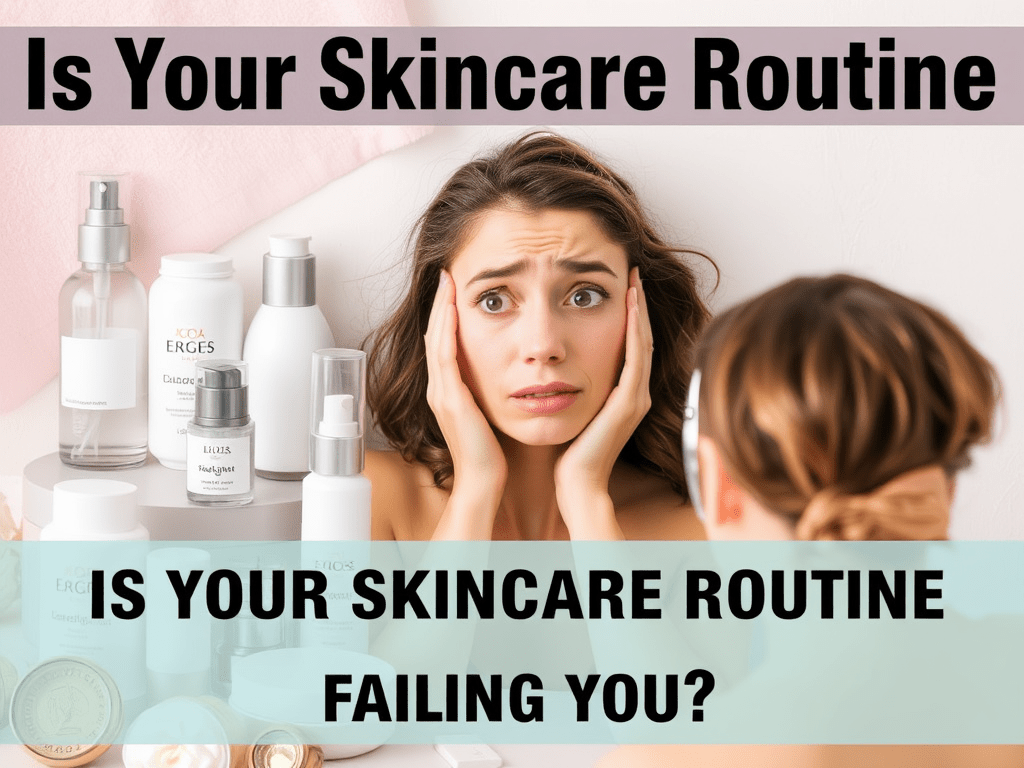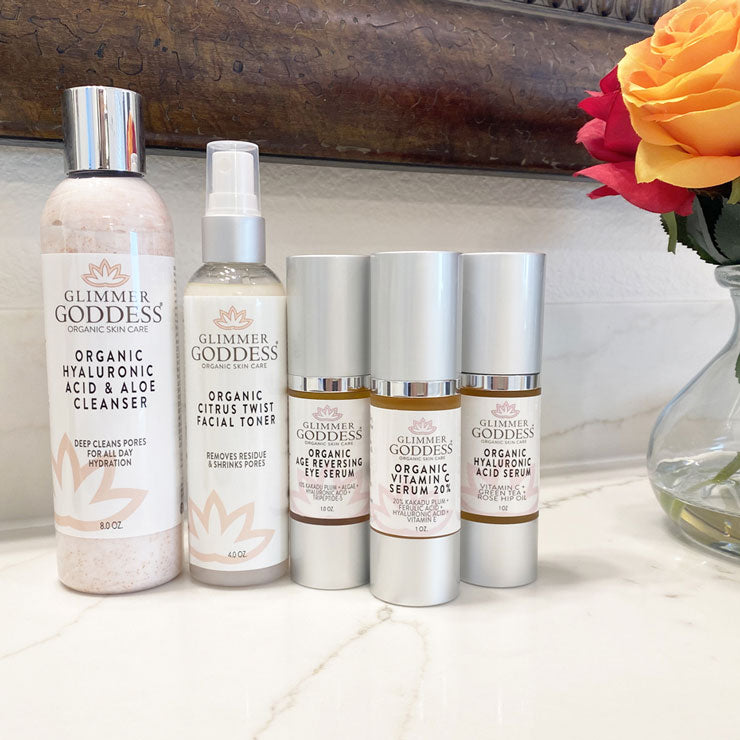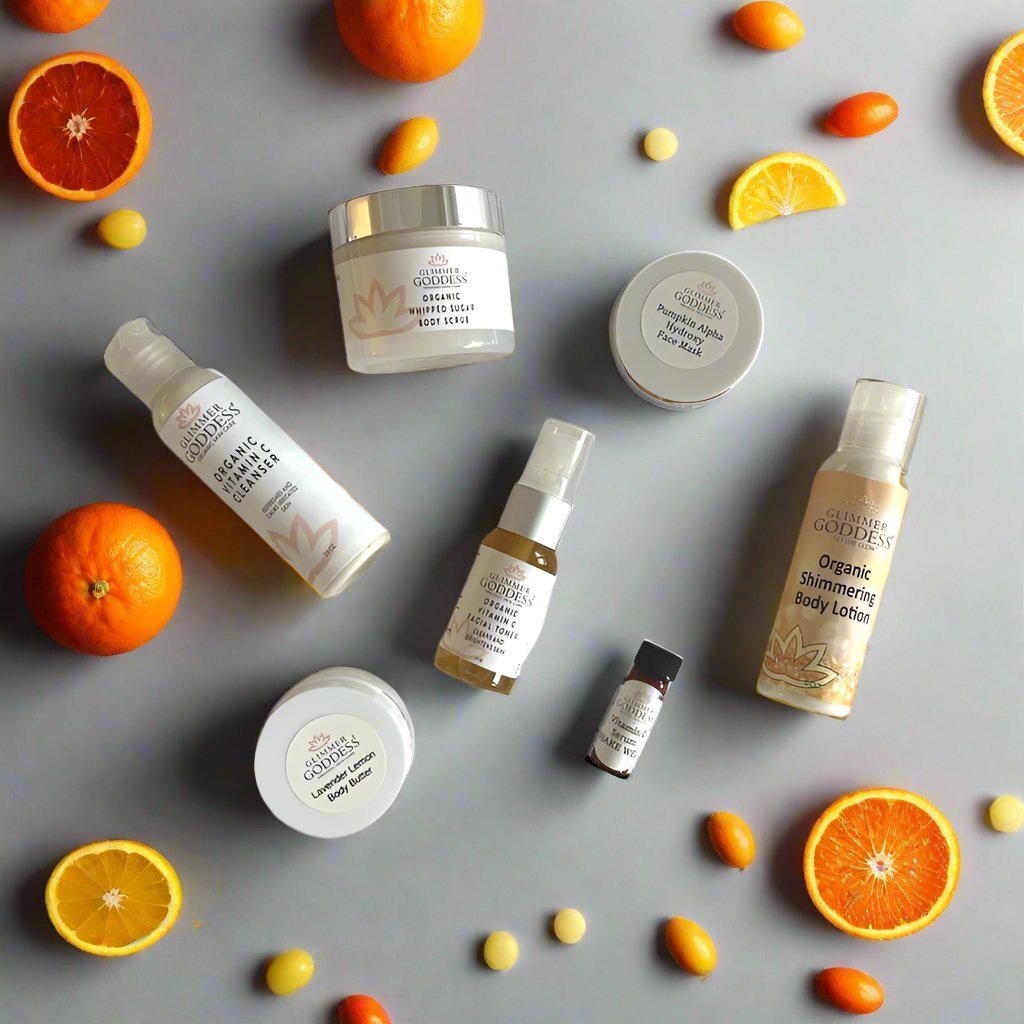
Is Your Skincare Routine Failing You? 7 Signs to Watch Out For!
Is your skincare routine not delivering the results you desire? You may be overlooking some key signs that indicate your regimen isn't working as it should. From unexpected breakouts to persistent dryness, recognizing these signals is crucial for achieving healthy, radiant skin. Dive into these 7 revealing signs and learn how to adjust your skincare routine for the best results.
Unlocking the Secrets to Clear, Radiant Skin
Are You Experiencing More Acne Than Usual?
It's no secret that acne can be a frustrating and persistent skin concern. From hormonal breakouts to clogged pores, there are a variety of factors that can contribute to the development of blemishes. If you've noticed an increase in your acne, it's important to understand the potential underlying causes so you can address them effectively.
Acne is a common skin condition that can be influenced by a combination of factors, including hormones, genetics, and lifestyle habits. While occasional breakouts are normal, a sudden increase in acne may signal a more significant issue that requires attention.
- Hormonal changes, such as those experienced during menstrual cycles, pregnancy, or periods of stress, can trigger an overproduction of oil, leading to clogged pores and the formation of blemishes.
- Genetics can also play a role, as some individuals are more prone to developing acne due to their skin's natural predisposition to producing excess sebum or being more sensitive to certain triggers.
- Lifestyle factors, such as diet, stress levels, and skincare routines, can also contribute to acne flare-ups. An imbalanced diet high in sugar and processed foods, for example, can exacerbate inflammation and promote the growth of acne-causing bacteria.
By understanding the potential causes of your increased acne, you can take proactive steps to address the underlying issues and achieve clearer, healthier skin.
Could Your Products Be Clogging Your Pores?
When it comes to managing acne, the products you use on your skin can make a significant difference. While some products may be designed to target blemishes, others could inadvertently be causing more harm than good by clogging your pores and exacerbating the problem.
Certain ingredients commonly found in skincare and makeup products can contribute to the development of acne by trapping dirt, oil, and bacteria within the pores. Identifying and avoiding these "pore-clogging" ingredients can be a crucial step in your acne-fighting regimen.
- Heavy, occlusive moisturizers, as well as thick, creamy foundations and concealers, can create a barrier that prevents the skin from properly shedding dead skin cells and releasing excess oil, leading to clogged pores and breakouts.
- Ingredients like petroleum, mineral oil, and silicones are often used in cosmetic products to provide a smooth, velvety texture, but they can also trap impurities and prevent the skin from properly breathing.
- Certain oils, such as coconut oil and palm oil, may be more comedogenic (pore-clogging) for some individuals, particularly those with acne-prone skin.
By carefully examining the labels of your skincare and makeup products and choosing non-comedogenic, oil-free, and water-based formulas, you can help minimize the risk of clogged pores and the subsequent development of acne.
Is Your Skin Reacting to New Ingredients?
Introducing new products into your skincare routine can be an exciting way to address your skin's changing needs, but it can also be a double-edged sword. In some cases, your skin may react negatively to new ingredients, leading to an unexpected acne outbreak.
Skin sensitivities and allergies can cause inflammation, redness, and the formation of blemishes. It's important to be mindful of any new products you incorporate into your routine and to pay attention to how your skin responds.
- Certain active ingredients, such as retinoids, salicylic acid, and benzoyl peroxide, can be effective in treating acne, but they can also be irritating for some individuals, especially if introduced too quickly or in high concentrations.
- Synthetic fragrances, preservatives, and other common cosmetic additives can trigger allergic reactions or sensitivities, leading to breakouts and other skin concerns.
- Even natural ingredients, such as essential oils or plant-based extracts, can cause irritation for some people, especially those with sensitive or acne-prone skin.
To avoid acne caused by new product introductions, it's best to introduce any new skincare items slowly and carefully, paying close attention to how your skin reacts. Patch testing and maintaining a consistent, gentle routine can help you identify and eliminate any problematic ingredients.
Are Environmental Factors Contributing?
While we often focus on our skincare products and internal factors when it comes to managing acne, the external environment can also play a significant role in the health and appearance of our skin.
Changes in season, exposure to pollution, and even the climate you live in can all contribute to the development of acne. Understanding how these environmental factors may be impacting your skin can help you take the necessary steps to combat breakouts.
- Fluctuations in temperature and humidity can affect the skin's oil production, leading to an increase in clogged pores and blemishes. During periods of high humidity, for example, the skin may produce more sebum, which can then trap dirt and bacteria.
- Exposure to pollutants, such as particulate matter, smoke, and chemicals, can cause irritation and inflammation, further exacerbating acne-prone skin.
- Certain climates, such as hot and humid environments, can create the perfect breeding ground for acne-causing bacteria, leading to more frequent breakouts.
By being mindful of how environmental factors may be influencing your skin, you can adjust your skincare routine and lifestyle habits accordingly. This may include using oil-blotting sheets, incorporating soothing, anti-inflammatory ingredients into your regimen, and protecting your skin from environmental aggressors.
By addressing the various factors that may be contributing to your increased acne, you can take control of your skin's health and achieve the clear, radiant complexion you desire. Remember, every person's skin is unique, so it may require some trial and error to find the right combination of solutions that work best for you.
Unlock the Secrets to Glowing, Hydrated Skin
Do You Notice Flaky or Tight Skin?
If you've been struggling with flaky, tight, or dull-looking skin, you're not alone. Many people face similar skin challenges, especially during seasonal changes or when their usual skincare routine isn't cutting it. The good news is, there are simple solutions to revive your skin's radiance and keep it hydrated all year round.
Dry skin can manifest in several ways, from visible flakiness to a tight, uncomfortable feeling. This is often a sign that your skin is lacking the essential moisture it needs to function at its best.
- Dry skin can be caused by a variety of factors, including environmental conditions, harsh cleansers, and even certain medications.
- When the skin's natural oil barrier is compromised, it loses moisture more quickly, leading to that unwanted tight, flaky appearance.
- Addressing the root cause of your dry skin is key to restoring a healthy, glowing complexion.
- Switching to a gentle, non-drying cleanser can make a big difference in maintaining your skin's moisture levels.
- Incorporating a rich, deeply hydrating moisturizer into your routine will help replenish lost moisture and strengthen the skin's protective barrier.
- Exfoliating gently once or twice a week can also help slough off dead, flaky skin cells, allowing your moisturizer to penetrate more effectively.
By listening to your skin's cues and making a few targeted adjustments to your routine, you can say goodbye to tight, flaky skin and hello to a radiant, hydrated complexion.
Are Your Moisturizers Failing You?
If you find that your skin still feels dry and uncomfortable despite diligently applying moisturizer, it's possible that your current products aren't providing the level of hydration your skin needs. Understanding the difference between hydration and moisture can help you choose the right products for your skin type and concerns.
Hydration and moisture are not the same thing, and using the wrong products can leave your skin feeling parched and unhappy.
- Hydration refers to the water content in the skin, while moisture is about the skin's oil or lipid content.
- Dehydrated skin lacks water, while dry skin lacks oil. Both can lead to a compromised skin barrier and various complexion concerns.
- Using a moisturizer that's not tailored to your specific skin type and needs can exacerbate dryness rather than resolve it.
- Look for moisturizers that contain humectants like glycerin, hyaluronic acid, or aloe vera to draw water into the skin and boost hydration.
- For dry skin types, opt for creams or balms that are rich in nourishing oils and emollients to replenish the skin's natural lipid barrier.
- If your skin still feels tight or flaky after moisturizing, try incorporating a hydrating serum or essence into your routine to provide an extra boost of water-based hydration.
By understanding the unique hydration and moisture needs of your skin, you can curate a personalized skincare regimen that leaves your complexion soft, supple, and radiant.
Is Weather Affecting Your Skin's Hydration?
The changing seasons can wreak havoc on our skin, with cold, dry air in the winter and hot, humid conditions in the summer. Understanding how environmental factors can impact your skin's hydration levels is the key to maintaining a healthy, glowing complexion all year round.
Weather and climate can have a significant influence on your skin's hydration status, and adjusting your routine accordingly is crucial.
- Harsh winds, low humidity, and indoor heating in the winter can rob your skin of essential moisture, leading to dryness and irritation.
- Conversely, hot, humid summers can cause your skin to produce excess oil, leading to a shiny, greasy appearance and clogged pores.
- Switching up your products and techniques with the seasons can help your skin stay balanced and healthy, no matter the weather.
- In the winter, look for thicker, more occlusive moisturizers to seal in hydration and protect the skin's barrier.
- Incorporate a hydrating facial oil or serum to provide an extra layer of nourishment and prevent trans-epidermal water loss.
- When the weather warms up, switch to a lighter, water-based moisturizer and consider using a mattifying primer or blotting papers to control shine.
- Exfoliating more frequently can also help clear away excess oil and dead skin cells during the summer months.
By staying attuned to how the weather affects your skin and making strategic adjustments to your routine, you can maintain a healthy, radiant complexion all year round.
Could You Be Over-Exfoliating?
While exfoliation is an essential step in any well-rounded skincare regimen, it's possible to have too much of a good thing. Over-exfoliating can lead to a compromised skin barrier, increased sensitivity, and even more dryness and irritation. Striking the right balance is key to keeping your skin glowing and happy.
Exfoliation is a powerful tool for revealing brighter, smoother skin, but it's important not to overdo it.
- Excessive exfoliation, whether through physical scrubs or chemical peels, can strip the skin of its natural oils and protective barrier.
- This can lead to increased sensitivity, redness, and even more pronounced dryness and flakiness.
- Finding the right frequency and intensity of exfoliation for your individual skin type is crucial for maintaining a healthy, radiant complexion.
- Start by exfoliating no more than 1-2 times per week, and pay attention to how your skin responds.
- If you notice increased tightness, redness, or peeling, scale back your exfoliation routine and focus on replenishing your skin's moisture levels.
- Look for gentle, non-abrasive exfoliants that contain alpha-hydroxy acids (AHAs) or beta-hydroxy acids (BHAs) to slough off dead skin cells without causing irritation.
By striking the right balance between exfoliation and hydration, you can reveal a brighter, smoother complexion without compromising your skin's health and natural radiance.
Achieving and maintaining healthy, glowing skin is a journey, but by understanding the root causes of dryness and flakiness and making targeted adjustments to your routine, you can unlock the secrets to a radiant, hydrated complexion all year round.
Unraveling the Mystery of Dark Spots: A Comprehensive Guide to Reclaiming Your Radiant Complexion
Are You Developing Dark Spots on Your Face?
Dark spots, also known as hyperpigmentation, can be a frustrating and often persistent skin concern. Whether they appear as small discolorations or larger patches, these unwanted blemishes can significantly impact the overall appearance of your complexion. Understanding the underlying causes and taking the right steps to address them is crucial to achieving a more even, luminous skin tone.
Hyperpigmentation: The Root of the Problem
- Dark spots are typically caused by an overproduction of melanin, the pigment responsible for skin color.
- This excess melanin production can be triggered by a variety of factors, including sun exposure, hormonal changes, and inflammation.
- Certain skin conditions, such as melasma or age spots, can also contribute to the development of dark spots.
Can Your Skincare Routine Be Making It Worse?
While a well-crafted skincare routine can be instrumental in addressing dark spots, it's important to be mindful of the products you're using. Certain ingredients or improper usage can inadvertently exacerbate the problem, making it even more challenging to achieve the desired results.
The Impact of Skincare Choices
- Harsh cleansers, exfoliants, and some skin lightening products can actually irritate the skin and stimulate increased melanin production.
- Certain actives, like retinoids or vitamin C, when used incorrectly or in excessive amounts, can also lead to further discoloration.
- Inadequate sun protection can negate the effects of any targeted dark spot treatments, allowing the condition to worsen over time.
Is Sun Exposure Impacting Your Skin Tone?
One of the primary culprits behind the development of dark spots is sun exposure. The UV rays from the sun can trigger increased melanin production, leading to the formation of those unwanted blemishes. Understanding the role of sun exposure and taking appropriate precautions is crucial for maintaining an even, radiant complexion.
The Sun's Influence on Hyperpigmentation
- Exposure to UVA and UVB rays can stimulate the overproduction of melanin, leading to the formation of dark spots.
- This is especially true for individuals with certain skin types or underlying conditions, such as melasma or post-inflammatory hyperpigmentation.
- Adequate sun protection, through the use of broad-spectrum sunscreen and protective clothing, can help prevent further discoloration and support the fading of existing dark spots.
Could Hormonal Changes Be Responsible?
Hormonal fluctuations can also play a significant role in the development of dark spots. Whether it's due to pregnancy, birth control, or other endocrine imbalances, understanding the connection between hormones and hyperpigmentation is essential for developing an effective solution.
The Hormonal Link to Dark Spots
- Increased levels of estrogen and progesterone, often experienced during pregnancy or with the use of certain birth control methods, can stimulate increased melanin production.
- Thyroid disorders, polycystic ovarian syndrome (PCOS), and other hormonal imbalances can also contribute to the appearance of dark spots.
- Managing underlying hormonal conditions through medical intervention and incorporating targeted skincare strategies can help mitigate the impact of hormonal-related hyperpigmentation.
Unraveling the mystery of dark spots requires a multifaceted approach that addresses the root causes of the issue. By understanding the various factors that can contribute to hyperpigmentation, from sun exposure to hormonal changes, you can develop a personalized skincare routine that effectively targets and fades those unwanted blemishes. With patience, persistence, and the right tools, you can reclaim the radiant, even-toned complexion you deserve.
Q&A
What are the common signs that my skincare routine is failing?
Common signs include increased acne, persistent dryness, flakiness, tight skin, and the development of dark spots. Recognizing these issues early can help you adjust your routine effectively.
How can I tell if my products are clogging my pores?
If you're experiencing more breakouts or blackheads than usual, it may be a sign that your products contain pore-clogging ingredients. Check the labels for comedogenic substances like mineral oil and certain oils.
What should I do if my skin reacts badly to a new product?
If you notice irritation or breakouts after introducing a new product, stop using it immediately. Patch test any new products on a small area of skin before full application to identify potential reactions.
How can environmental factors affect my skincare?
Environmental elements like pollution, humidity, and temperature can impact your skin's oil production and hydration levels, resulting in breakouts or dryness. Adjust your routine based on seasonal changes.
What type of moisturizers should I use to combat dry skin?
Look for moisturizers containing humectants like glycerin or hyaluronic acid, as they help retain moisture. For extremely dry skin, opt for thicker creams or balms loaded with nourishing oils.
How does over-exfoliating affect my skin's health?
Over-exfoliating can strip the skin of its natural oils and lead to irritation, making conditions like dryness and sensitivity worse. Limit exfoliation to 1-2 times per week, based on your skin type.
What can I do to address dark spots on my face?
To reduce dark spots, incorporate targeted treatments such as vitamin C serums, retinoids, and SPF protection to prevent further hyperpigmentation. Consistency is key for visible results.
Achieving and maintaining a glowing complexion is a continuous journey that requires monitoring and adapting your skincare routine. By being attentive to the signs of a failing skincare regimen, from increased acne to unexpected dryness, you can take corrective actions to ensure your skin receives the care it needs. Keep in mind that every person's skin is unique, so be prepared to experiment and find the best products and techniques that work for you. Your skin deserves the best!








